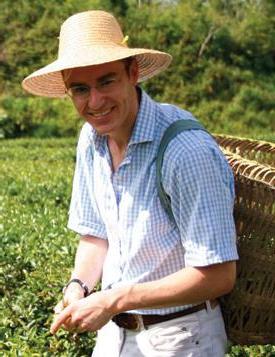
8 minute read
JUST OUR CUP OF TEA Lincoln
JUST OUR CUP OF TEA
Tea remains our national beverage, despite the upsurge in multinational coffee shops and ‘coffee to go.’ In fact, we consume over 165,000,000 cups of tea each day, 60,225,000,000 every year, and it’s the second most popular drink in the world, after water. How much do you know about the 1,500 varieties of ‘camellia sinensis’ available. though? One man intent on educating and enthralling tea drinkers everywhere is Lincoln’s Will Battle... and he’s just potty, about tea!
Advertisement
It takes about five minutes to brew the perfect cup of tea. But it’s taken considerably longer than that for Will Battle of Potterhanworth to write his book, a definitive World Tea Encyclopaedia.
It’s not surprising that it’s taken so long. After all, the world of tea is huge, not just geographically but culturally and in terms of the scientific minutiae of camellia sinensis, a plant which has over 1,500 varieties.
Not withstanding the huge subject matter, Will’s book is over 400 pages in length, with over 90,000 words and 300 images plus maps and diagrams.
Within just an hour of meeting Will he had become my hero, a true Englishman celebrating the quirks and perks of this most English beverage.
It’s a running joke in the office that I’m powered by sweet, milky tea. I’m happy to forgo breakfast and lunch, but going just a couple of hours without a cup of tea means lethargy and a dramatic drop in concentration. Tea is the first thing I need in the morning, and that constant craving remains with me throughout the day.
Despite this appreciation, I barely stray from a conventional, common blend from a multinational brand name. Except for the odd Earl Grey, maybe an Assam or Darjeeling, my ex
perience of tea, like many people’s is sadly incredibly limited, despite it being the food or drink product I consume most of across my entire diet. I’m not alone, either.
However, coffee is now culturally endemic. Colloquially we ‘go for a coffee,’ rather than a cup of tea, and talk about coffee shops, rather than tea shops. Restaurants refer to after dinner coffee and have large complex
Above: Will Battle, Potterhanworth author, celebrated the completion of his magnum opus with... what else... but a cup of tea. The 400 page book is available now. machines which hiss and screech and froth up milk and grind beans. There’s no theatre when making tea - no chrome machines costing tens of thousands of pounds - and whilst there’s a fancy term for someone who makes coffee - a barista - there’s no similar term for someone who makes great tea... although I find ‘Mrs Davis’ comes close.
Yet despite being lower-key in nature, tea is still more popular than coffee as a national drink, and we’re the second largest consumer of it in the world, per capita, after Ireland. Astonishingly, Will can think of no comparable book to the encyclopaedia that has taken him 10 years to write.
“My bookshelf is heaving with books about wine,” he says. “Different grapes, regions, varieties and those ambitiously promising a comprehensive overview of the subject,” he says. “But there are no such books offering an overview of tea producing countries and processes.”
“I’m from Potterhanworth and was born into a farming family. My great uncle managed a Kenyan tea plantation in the early 20th century, but that’s incidental, there’s no real connection except for an affinity for farming which, essentially, is what tea growing is.”
“When I left Warwick University, having read German and obtained a degree, I
joined Tetley, and trained for two years to become a tea taster. I’d have to try hundreds of samples a day, and buy for consistency across multiple characteristics from colour and reflection to pungency or mouth feel.”
“I had a real sense of wanderlust and one of the best things about working in the world of tea is the incredibly beautiful places that it takes you to. China and India are the largest producers in the world, but there’s a terrific domestic market for it there, so Kenya is the world’s biggest exporter. Sri Lanka and India, too, are incredibly beautiful.”

“Apart from the incredible travel opportunities, one of the greatest aspects of working with tea producers is the fact that you never stop learning.”
“Just when you think you’ve a sound knowledge, you’re reminded with a fresh infusion of new information just how diverse the subject is.”
“I think that’s why, despite the fact that there are books about specific aspects of the industry, nobody has had the time before to produce what I hope my book is; an overview of the countries, processes, varieties and cultural idiosyncrasies of tea... one that’s detailed enough for experts, but also accessible enough for the public.”
And Will’s World Encyclopaedia of Tea is definitely something that tea drinkers can enjoy reading. Detailed as it is, it’s also beautifully illustrated and laid out.
The term encyclopaedia implies that it’ll be dry and laid out as a list but that’s a complete misnomer; it’s accessible, and cleverly executed with, for instance, an infographic ‘flavour wheel’ for quick reference on the inside front cover, and flow charts showing
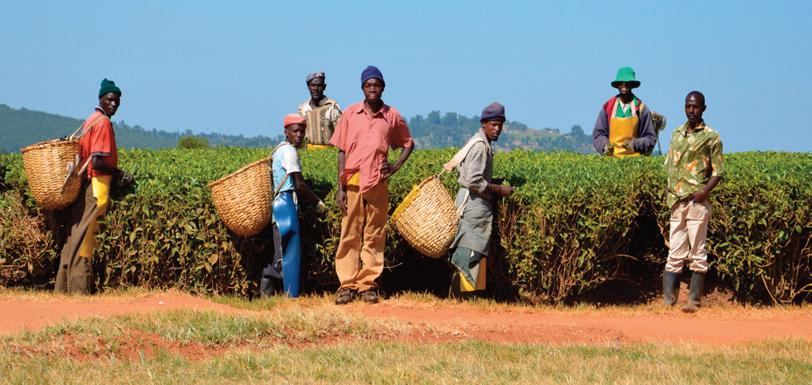
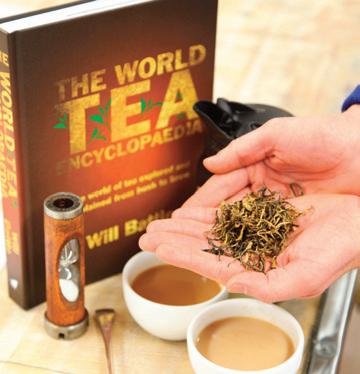

Top: Tea plantation in Mozambique, and tea pluckers in Kenya, a country with a relatively young but dependable industry.
Above: Will, a Potterhanworth tea merchant, also worked with Lincolnshire based Lincoln Tea & Coffee to create the county’s own tea blend.
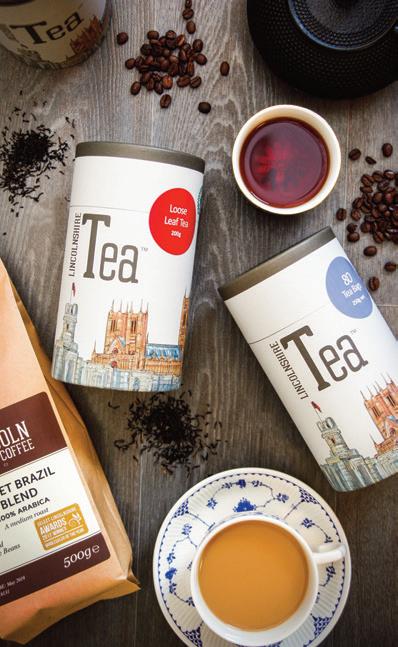
Left: During my visit Will took me on a private ‘tea tour’ with 13 different brews, designed to provide an insight into characteristics like varieties, low and high grown varieties, the differences between, for instance, several darjeeling varieties, and the differences that climate and weather can introduce.

the processes of cultivars and production methods. This was all learned as Will worked for some of the UK’s biggest tea brands including Tetley, founded in 1837.
Having left Tetley after a decade, Will joined Douwe Egberts to buy tea for the firm’s Pickwick brand.
He lived in Switzerland and then in the Netherlands until 2016 before moving back to Lincolnshire to begin his new business as a tea merchant providing estate teas and bespoke blends to small tea shops and retailers across the UK.
The setting up of his business coincided with the completion of his book, which is now available in hardback form, and is aimed at consumers, rather than the industry, and with a little guidance, it’s easy to gain an insight into Will’s world.
Naturally, prior to my visit the expert had the kettle on, but rather than just one cup of tea, we enjoyed no fewer than 13. With an apron, a teaspoon and a spittoon, Will set about providing me with a world tour of tea estates, and varieties.

We began with an Assam, a high-grown Kenyan from the Aberdare Mountains and a Ceylon from the Uva Highlands. These are typically used in different combinations in breakfast tea blends to provide our expected characteristics of body, looks and flavour respectively.
Will then used two different examples of Darjeeling - a Gielle and a Teesta Valley example - to demonstrate what in wine terms is terroir, before showing me the result of high-grown and low-grown tea varieties.
Next were two green teas, including a Dragon Well, then an expensive Silver Needle from Fujian Province, a soft sweet, pale tea. Then we tried a few tea oddities.
These included an Oolong green tea - produced by bruising the outer rim of the leaf in a special wicker basket - and a yellow tea, created with a highly-skilled artisanal process known as sweating that requires im
Above: Women with fresh tea leaves in the basket at tea garden in Darjeeling. Left: Will celebrates his unique encyclopaedia. mense skill of the teamaker and deep pockets of the buyer. My favourite was Will’s penultimate tea, a Jasmine Pearl variety demonstrating how tea can be scented with floral aroma, and he rounded off the experience with a Pu Erh Leaf from China’s Yunnan Province, a dark, aged tea. My education underway, and armed with a book, Will advised a trip to one of the county’s local tea sellers, Imperial tea on Lincoln’s Steep Hill, or Stokes on Lincoln High Street, for example, where I could continue my education. “It’s been a decade of hard work but I’m really pleased with the result.” says Will. “It’s a book that takes in geography, culture, history and of course, the profound pleasure of enjoying a cup of tea!” We’ll recommend the book enormously... we’re tempted to describe it as a great ‘coffee table book,’ although that would rather contradict its subject matter, wouldn’t it!?! n The World Tea Encyclopaedia, is now on sale, published by Matador, £29.99, 400 pages, ISBN 978178589313, Call 01235 465521 for details.




You can now enjoy your Pride Magazine with our brand new App on your tablet... completely free of charge!
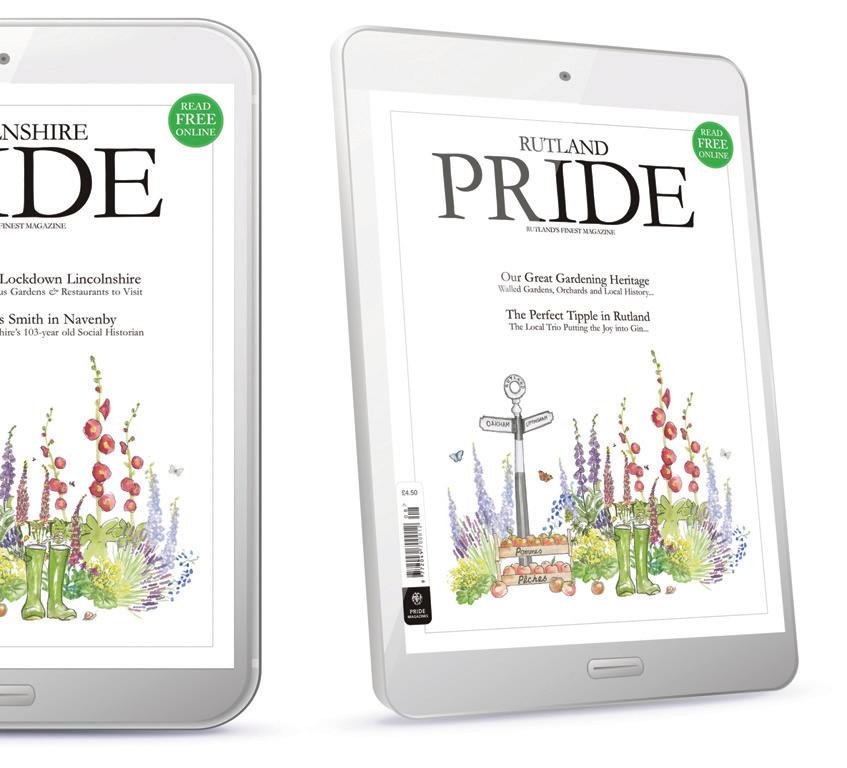
Read online now at www.pridemagazines.co.uk










